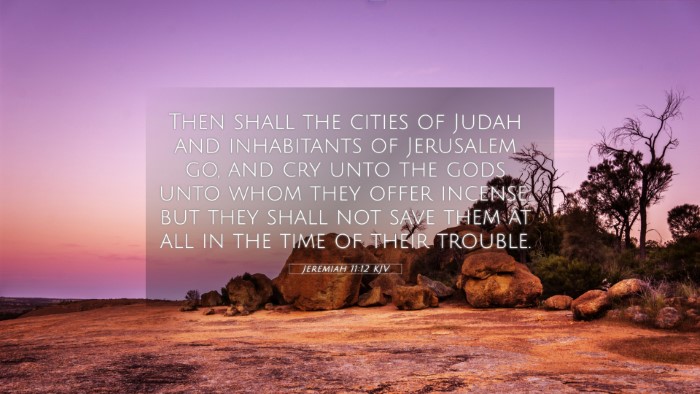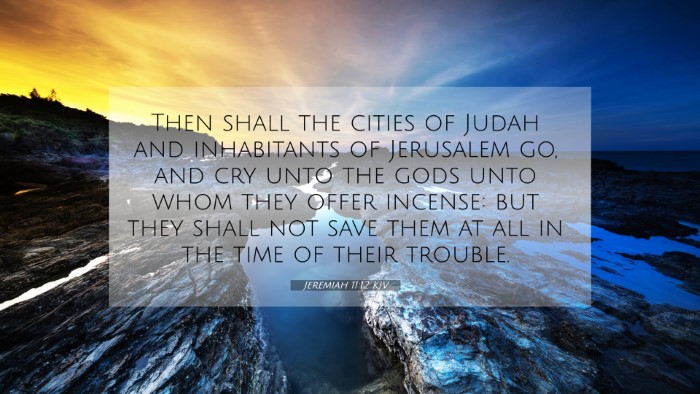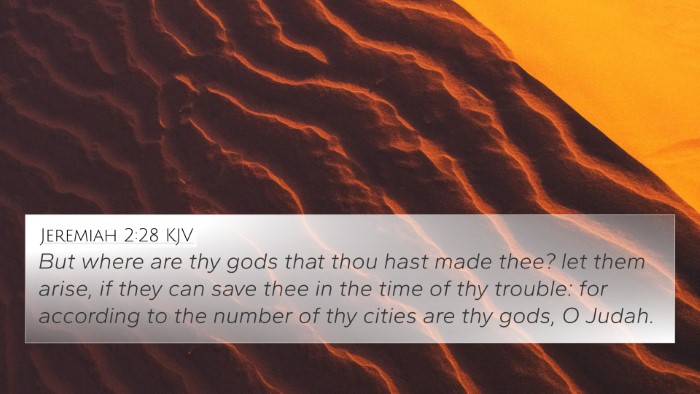Understanding Jeremiah 11:12
Verse: "Then shall the cities of Judah and the inhabitants of Jerusalem go, and cry unto the gods unto whom they offer incense: but they shall not save them at all in the time of their trouble."
Summary and Interpretation
This verse captures a moment in the prophetic ministry of Jeremiah, where the consequences of idolatry and disobedience to God are laid bare. Matthew Henry, Albert Barnes, and Adam Clarke provide valuable insights into the meaning and implications of Jeremiah 11:12.
Contextual Background
- Historical Setting: This passage occurs during a time of spiritual decline for Israel, where reliance on false gods often led to calamity.
- Prophetic Warning: Jeremiah is conveying God's message, warning the people about the futility of their actions.
Insights from Commentaries
Matthew Henry: He emphasizes the irrationality of calling upon idols which have no power to save. The contrast between the living God and the lifeless idols highlights the importance of genuine faith in divine providence. Henry notes, "The gods they sought would be found ineffectual in their hour of need."
Albert Barnes: Barnes interprets this as a direct challenge to the people of Judah. He points out that in their time of distress, they would turn to the very gods they worshipped, only to discover their impotence. He presents this as a sober reminder of the consequences of forsaking the true God.
Adam Clarke: Clarke includes a reflection on how the people of Judah had formed inappropriate attachments to foreign deities. He argues that this verse serves as a warning about misplaced trust, encouraging an evaluation of whom one truly relies upon in times of trouble.
Thematic Connections
This verse encapsulates a critical theme in the Bible: the futility of idolatry. This is echoed in numerous other scriptures, establishing strong connections between Bible verses.
Cross-References to Jeremiah 11:12
- Isaiah 41:29: "Behold, they are all vanity; their works are nothing: their molten images are wind and confusion."
- Jeremiah 2:27: "Saying to a stock, Thou art my father; and to a stone, Thou hast brought me forth..."
- Psalms 115:4-7: "Their idols are silver and gold, the work of men's hands..."
- 1 Corinthians 8:4: "We know that an idol is nothing in the world, and that there is none other God but one."
- Revelation 9:20: "And the rest of the men which were not killed by these plagues yet repented not of the works of their hands, that they should not worship devils..."
- Hosea 8:4: "They have set up kings, but not by me: they have made princes, and I knew it not..."
- 2 Kings 17:38-39: "And the covenant that I have made with you ye shall not forget; neither shall ye fear other gods..."
Understanding Cross-References
The Bible verse cross-references provide deeper insight into the themes of faithfulness and reliance on God as opposed to idols. These inter-Biblical dialogues enrich our understanding of Jeremiah’s warning against spiritual infidelity.
The Role of Cross-Referencing in Bible Study
Using tools for Bible cross-referencing such as a Bible concordance or Bible cross-reference guide can greatly aid in understanding the connections between Bible verses. For example:
- Identify patterns in prophetic literature that consistently warn against idolatry.
- Explore comparative Bible verse analysis between the messages of the Prophets and the Apostolic writings.
- Utilize a Bible chain reference system to trace themes through scriptures.
Practical Application
So how can we apply the lessons from Jeremiah 11:12 today? Here are suggestions for cross-reference Bible study methods:
- Reflect on areas of life where we may be relying on 'idols' instead of seeking God for help.
- Study relevant themes such as the nature of God and the promises of His salvation.
- Engage in community discussions about the implications of idol worship in a modern context.
Conclusion
Jeremiah 11:12 serves as a profound reminder of the futility of seeking help in anything other than the one true God. By employing tools for Bible cross-referencing, we can deepen our understanding of scripture and enhance our spiritual lives.








